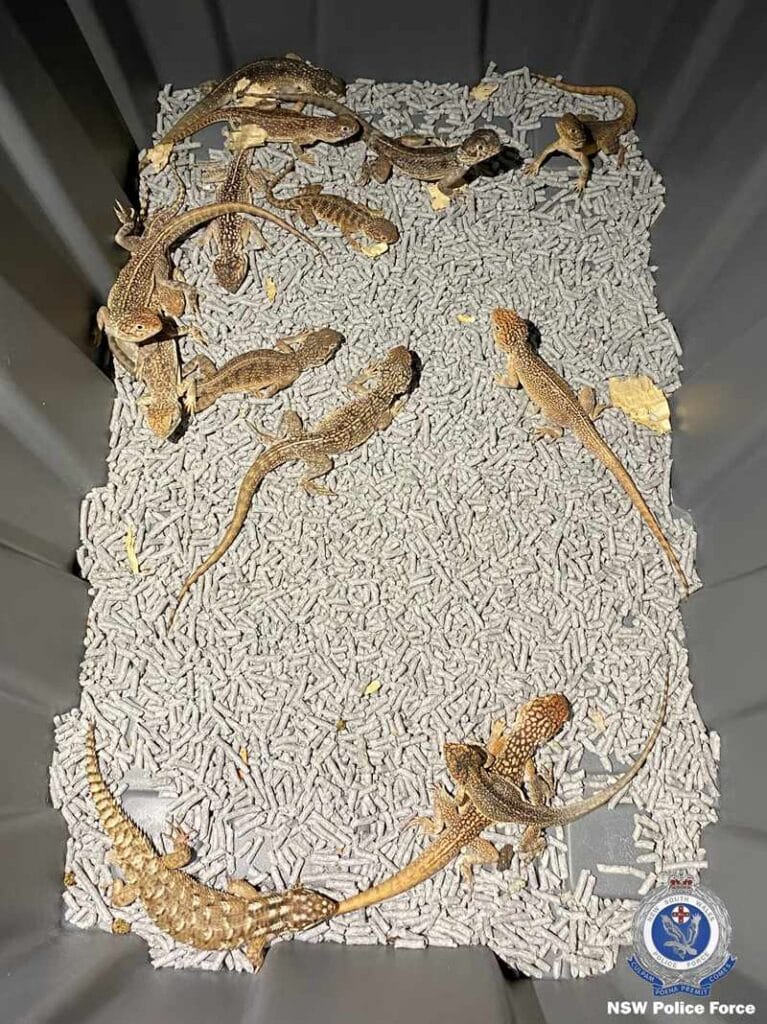‘Cold-blooded and cruel’: NSW Police dismantle reptile smuggling syndicate
January 8, 2024


Key points: NSW Police wildlife trafficking investigation
• Incident: Seizure of 257 lizards in NSW, Australia.
• Operation: Conducted by NSW Police Raptor Squad under Strike Force Whyratta.
• Collaboration: Federal Department of Climate Change, Energy, the Environment and Water, and NSW Department of Planning and Environment.
• Arrests: Four individuals charged with offences related to illegal export of native species.
• Outcome: Reptiles valued at approximately $1.2 million were rescued and taken to wildlife parks for care.
Dozens of lizards and reptiles have been intercepted by government authorities, with NSW Police saying a criminal syndicate allegedly involved in reptile smuggling and the illegal wildlife trade has been dismantled.
In September last year, 59 live lizards were found in nine packages that had been intercepted on their way to Hong Kong.
That led NSW Police Force’s Raptor Squad to establish Strike Force Whyratta to investigate the alleged illegal native animal and reptile exports.
The Federal Department of Climate Change, Energy, the Environment and Water and NSW Department of Planning and Environment, all assisted NSW Police with the investigation.
Illegal wildlife trade: the strike force investigation


Police say it was after extensive inquiries by the strike force that detectives to execute warrants at two homes in Pendle Hill, where they located 16 native lizards and eggs.
It’s alleged those lizards were in a box that was addressed to Hong Kong.
A further 60 native lizards were located in a storage room at the home.
Raptor Squad commander Detective Superintendent Andrew Koutsoufis told media a 59-year-old man was running the alleged syndicate.
He also said that one of the men was regularly travelling to remote areas of the country, including Western Australia and the Northern Territory, to trap the reptiles and bring them back.
Detective Superintendent Koutsoufis described the alleged actions of the group as “cold blooded and cruel” and said the animals were kept in poor conditions.
They were bound in small containers, including chip packets, handbags, and cereal containers.
“Thankfully, most of them have survived their arduous journey”.
“It’s a good result that we’ve been able to get in there early enough to save the vast majority of these animals.”
Two people – a 41-year-old woman and a 54-year-old man, were arrested in Pendle Hill on separate days. Both have been charged with multiple offences relating to exporting native species without permission; they remain before the courts.
During a subsequent search warrant of an address in East Hills police located 118 lizards, three snakes, 8 eggs and 25 deceased lizards.
Police say further lizards were found at a home at Grenfell in country NSW.
Two further people have been arrested and charged and are before the courts.


Reptile smuggling
Police will allege in court the criminal group were catching live lizards and native Australian reptiles to export for profit to Hong Kong. The animals were kept in poor conditions and bound in small containers when they were packaged to be sent.Over the course of the investigation – during both search warrants and package intercepts – officers located 257 lizards, which were taken to various zoos and wildlife parks for examination by a vet before being released back to the wild.Based on an average of $5000 per lizard, the total value of reptiles seized by police is approximately $1.2m.
More to come.
Wildlife trafficking and animal suffering
• Global scale: Wildlife trafficking is a major illegal trade, severely impacting animal populations worldwide.
• Physical harm: Trafficked animals often suffer from injuries due to cramped conditions and rough handling.
• Psychological effects: The stress of captivity and transport can cause long-lasting psychological trauma.
• Health issues: Improper care during trafficking leads to malnutrition and disease, often fatal for the animals.
• Disrupted behaviours: Removal from natural habitats prevents normal social and behavioural patterns.
• Conservation impact: Trafficking contributes to the decline of species, some already endangered.
READ MORE FROM ANIMAL FRIENDLY LIFE
Inaugural event to bring rescue dogs and aged care residents together
